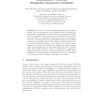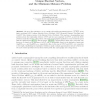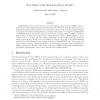140
click to vote
CRYPTO
2009
Springer
15 years 7 months ago
2009
Springer
We present a new methodology for proving security of encryption systems using what we call Dual System Encryption. Our techniques result in fully secure Identity-Based Encryption ...
105
Voted
CRYPTO
2009
Springer
15 years 7 months ago
2009
Springer
We consider two-party quantum protocols starting with a transmission of some random BB84 qubits followed by classical messages. We show a general “compiler” improving the secur...
84
Voted
CRYPTO
2009
Springer
15 years 7 months ago
2009
Springer
We construct an efficient delegatable anonymous credentials system. Users can anonymously and unlinkably obtain credentials from any authority, delegate their credentials to other ...
101
Voted
CRYPTO
2009
Springer
15 years 7 months ago
2009
Springer
Abstract. We show that only languages in BPP have public-coin, blackbox zero-knowledge protocols that are secure under an unbounded (polynomial) number of parallel repetitions. Thi...
86
Voted
CRYPTO
2009
Springer
15 years 7 months ago
2009
Springer
CRYPTO
2009
Springer
15 years 7 months ago
2009
Springer
We prove the equivalence, up to a small polynomial approximation factor n/ log n, of the lattice problems uSVP (unique Shortest Vector Problem), BDD (Bounded Distance Decoding) and...
69
Voted
CRYPTO
2009
Springer
15 years 7 months ago
2009
Springer
95
Voted
CRYPTO
2009
Springer
15 years 7 months ago
2009
Springer
sion of an extended abstract published in Proceedings of Crypto 2009, Springer-Verlag, 2009. Available from the IACR Cryptology ePrint Archive as Report 2008/510. We show that an ...
116
Voted
CRYPTO
2009
Springer
15 years 7 months ago
2009
Springer
We present the first signature scheme which is “short”, stateless and secure under the RSA assumption in the standard model. Prior short, standard model signatures in the RSA...
108
Voted
CRYPTO
2009
Springer
15 years 7 months ago
2009
Springer
RSA-FDH and many other schemes secure in the Random-Oracle Model (ROM) require a hash function with output size larger than standard sizes. We show that the random-oracle instanti...



